How the EU police training agency is cosying up to the Arab League’s political extradition body
Topic
Country/Region
02 July 2024
CEPOL, the EU police training agency, is collaborating with the Arab League’s political extradition body in spite of its human rights obligations.
Support our work: become a Friend of Statewatch from as little as £1/€1 per month.
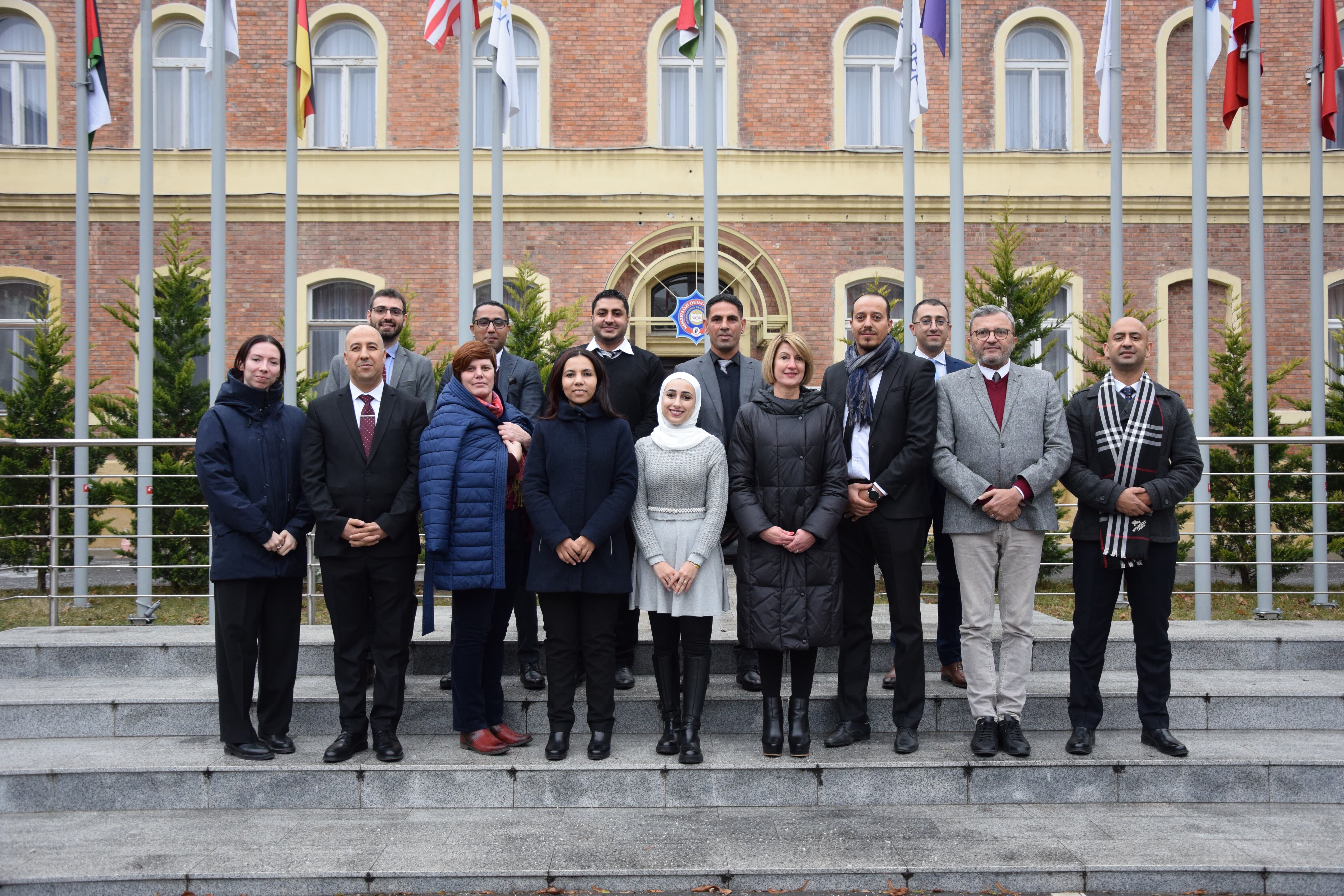
Participants at a EUROMED Police workshop hosted by CEPOL. Image: CEPOL
This article is co-published with The New Arab.
On 20 September 2023, Montserrat Marín Lopez, the executive director of the EU’s law enforcement training agency CEPOL, met in Cairo with Dr. Mohammad Bin Ali Kuman, the secretary general of the Arab Interior Ministers’ Council (AIMC).
The meeting was part of an official visit of Ms. Lopez to Egypt, aiming to connect “with existing and new CEPOL partners to explore different opportunities of collaborating in the future,” as per an announcement on CEPOL’s website a few days later.
The announcement failed to mention what these collaboration opportunities entailed.
Of the meeting with Dr. Kuman, it simply stated that “all parties reiterated their strong commitment to strengthen the fight against terrorism and organised crime.”
Thanks to emails and documents obtained as part of multiple freedom of information requests, The New Arab (TNA) Investigate Unit can reveal the extent of the cooperation envisioned by CEPOL with the AIMC.
It involved collaborating with the Council to coordinate the collection and exchange of information on terrorism matters in the MENA/SWANA region, despite the AIMC’s failure to include safeguards against human rights abuses into its existing information-sharing systems.
This terrorism information exchange programme, part of what is known in Europe as the EU’s Terrorism Situation and Trend report (TE-SAT), was piloted in five countries, namely Morocco, Algeria, Tunisia, Lebanon and Jordan.
The documents also reveal that CEPOL has engaged with the AIMC on the establishment of a working arrangement, which would allow Arab law enforcement agencies to access what has been dubbed as “the EU Training Regime Teaching Neighbours How to Spy”.
Taken together, these revelations show the continuation of the EU’s strong bias towards security dynamics in dealing with Arab League states, at the expense of its obligations vis-à-vis human rights and EU law.
The role of the AIMC in political repression
Founded in 1982, the Arab Interior Ministers’ Council is a specialised body within the Arab League, also known as the League of Arab States (LAS), composed of the ministers of the Interior of the 22 members.
The Council aims to “develop and strengthen cooperation and coordinate efforts between Arab countries in the field of internal security and combating crime”.
As part of this role, the AIMC can circulate arrest and extradition requests from one of its member states among the rest of the countries in the League.
This role has earned the Council the nickname “Arab Interpol”, in reference to the France-based organisation which coordinates international requests for police cooperation through its Notices and Diffusions system.
While the AIMC maintains a low profile internationally, it has started playing a bigger role in the arrest and detention of Arab dissidents, including those in exile, as soon as they travel anywhere in the MENA region.
On 6 November 2022, Egyptian-American activist Sherif Osman was reportedly arrested outside a restaurant in Dubai after the AIMC had shared a warrant for his arrest in Egypt.
Osman, a former Egyptian Air Force captain who has lived in the US since 2004, was charged by the Emirati authorities with “inciting [sic] by publishing information on the internet” and “not complying with the [Egyptian] state’s legislation in force”.
A few weeks prior to his visit to Dubai, Osman had reportedly posted on his Youtube channel a call to his fellow countrymen to protest against the Egyptian regime, while the country was hosting the COP27 climate conference in Sharm El-Sheikh.
Osman was eventually released after 46 days in detention.
Besides Osman, Geneva-based legal advocacy NGO MENA Rights Group identified two other instances where the circulation of arrest warrants through AIMC led to the extradition and detention of political dissidents.
The Freedom Initiative, a US-based NGO which advocates for people wrongfully detained in MENA, has reportedly established that the AIMC might have been involved in at least nine cases of arrest or extradition of political dissidents between 2016 and 2023.
According to MENA Rights Group, members of the Arab League are more prone to abuse the AIMC’s arrest warrant circulation system because the legal basis of the Council allows for politically motivated extraditions to take place.
“Contrary to INTERPOL, [...] the AIMC does not appear to have an oversight body destined to filter out abuses of its systems,” according to a March 2023 report by the NGO.
Interpol has been similarly criticised for its role in transnational repression.
An Interpol spokesperson told The New Arab that the organisation “knows Red Notices are powerful tools for law enforcement cooperation and is fully aware of their potential impact on the individuals concerned. This is why we have robust processes, which have been significantly strengthened over the last few years, to ensure our network is used appropriately”.
Article 3 of Interpol’s constitution forbids the organisation from “undertak[ing] any intervention or activities of a political, military, religious or racial character”.
In June 2020, the leader of the Russian Wagner mercenary group Yevgeniy Prigozhin was able to overturn an Interpol Red Notice issued by the United States against him over his alleged interference in the 2016 US election.
An Interpol independent commission highlighted the “predominant political dimension” of the Prigozhin case, and decided to withdraw the notice to maintain the neutrality of the organisation.
Alexis Thiry, legal advisor at MENA Rights Group, told TNA that he fears “the AIMC may be resorted to in lieu of INTERPOL in light of the apparent lack of oversight characterising the AIMC’s warrant-circulation.”
These same concerns were raised on 23 June 2023 in a letter sent from three UN Special Rapporteurs to the Arab League. In their view, the AIMC’s circulated notices “do not appear to comply with the obligations of [UN] Member States under international law, in particular with principles of non-refoulement, non-discrimination, due diligence and fair trial and may implicate the duty to protect the rights to freedom of opinion and expression”.
The three UN experts called on the AIMC to “create an independent, accessible, and transparent legal mechanism, allowing wanted individuals to access their criminal file and request the review or removal of an arrest warrant”.
It is not clear whether the AIMC has complied with this call from the UN Special Rapporteurs.
The AIMC reportedly established in 2017 a legal committee tasked with reviewing its arrest warrants, and evaluating whether they comply with approved standards. But it is unclear if individuals can appeal to this committee.
“Very little information is available on this mechanism. We don't know if it's operative. It is unlikely that it can be seized [i.e. used] by people subject to a warrant circulated by AIMC. Moreover, the Committee is not independent, as it is made up of member states,” added Thiry.
However, the AIMC’s growing role in transnational repression does not seem to deter its EU counterparts from collaboration.
‘Capacity building’
Besides CEPOL, the AIMC cooperates with a whole range of EU bodies, according to the documents we obtained.
A presentation delivered by the AIMC in October 2022 lists the European Border and Coast Guard Agency (Frontex), the EU Agency for Criminal Justice Cooperation (Eurojust), and the EU Agency for Law Enforcement Cooperation (Europol), among its partners in the EU.
Reached for comment, a spokesperson for Eurojust told TNA that “at this stage there’s no strategic structural cooperation between the AIMC and Eurojust.”
A spokesperson for Frontex stated that the “AIMC is indeed one of our valued partners” in the EU agency’s effort in enhancing border management and information gathering about irregular migration. They added that “cooperation should always be grounded in mutual trust and respect for human rights.”
No comment was received from Europol about the extent of their collaboration with the AIMC at time of publication.
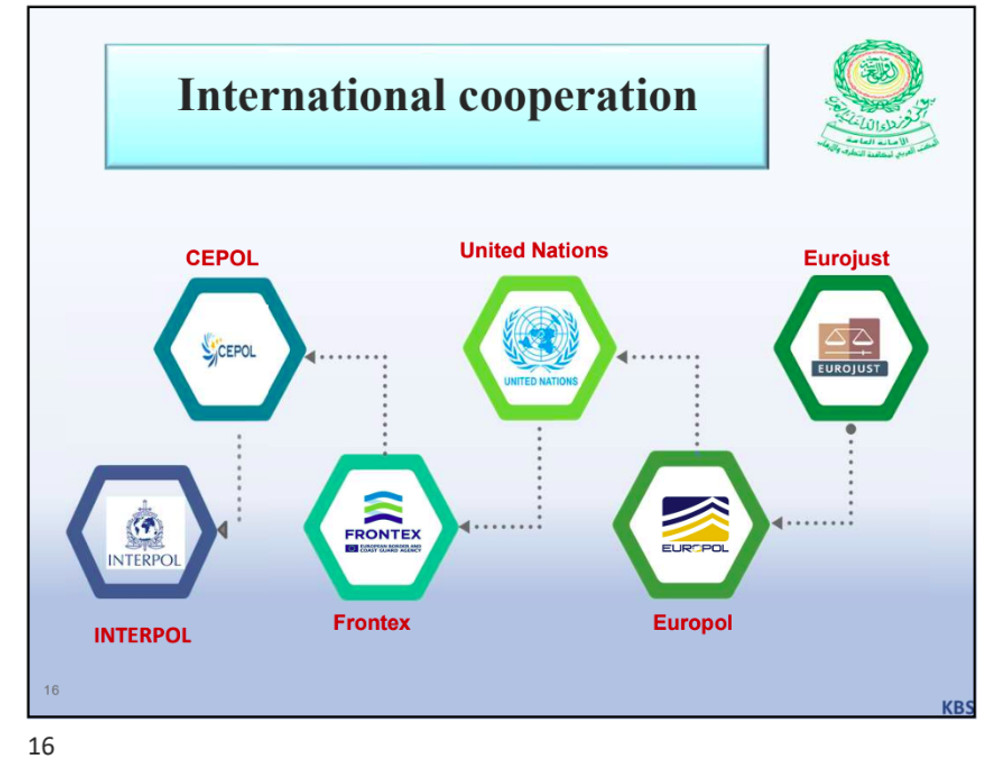
Screengrab from a presentation given by the AIMC’s counterterrorism office in October 2022. It lists some of the international organisations AIMC is cooperating with.
CEPOL, for its part, lists the Arab League as a beneficiary in at least two of its projects in the so-called EU Southern Neighbourhood countries.
The EU Southern Neighborhood includes ten countries, nine of which are members of the Arab League.
According to its Consolidated Annual Report for the year 2022, CEPOL negotiated in 2020 funding for four projects totalling €23.5 million to “assist third countries [from EU’s Neighbourhood] in building their capacities in relevant law enforcement policy areas, in line with the established priorities” of the EU.
Of the €23.5 million, some €14.46 million went to projects that specifically target the Arab League and its member countries.
The funding came from the European Commission (EC), one of the executive bodies of the EU.
Some researchers have criticised the EU’s approach to collaboration with the Arab League.
The EU’s capacity building projects in the region tend to be strongly skewed towards security dynamics, and “of greater interest to the EU than to the LAS”, according to a December 2023 research report by the German Institute for Global and Area Studies.
TNA asked the AIMC what the extent of its contribution to CEPOL’s projects was, and whether the projects were of greater benefit to the EU.
The Council responded that its role was limited to that of “an observer”, as it was tasked with sharing with the wider Arab League the results of any “successful experiences” that involve a subset of member countries (i.e. Morocco, Algeria, Tunisia, Lebanon and Jordan).
“The cooperation of the AIMC with regional and international bodies [...] is based on the principle of addressing security challenges in a way that achieves common goals and that benefits all parties,” the AIMC told TNA.
“And this is also the case with regards to the cooperation with the various EU agencies concerned with security matters,” it added.
MENA-focused ‘strategic analysis’ on terrorism
The ongoing collaboration between CEPOL and the AIMC started when its former Executive Director attended the AIMC’s Heads of Security Training and Qualification Institutions conference on 30 June 2021.
During the conference, CEPOL presented a working paper on the role of training in the EU’s security strategy.
The presentation, obtained by TNA through a Freedom of Information request, explains CEPOL’s role in “providing the most suitable training for law enforcement officials across the EU”.
The presentation also describes Europol’s portfolio of Threat Assessment reports, which it compiles as part of its mandate of coordinating the work of law enforcement agencies in the EU.
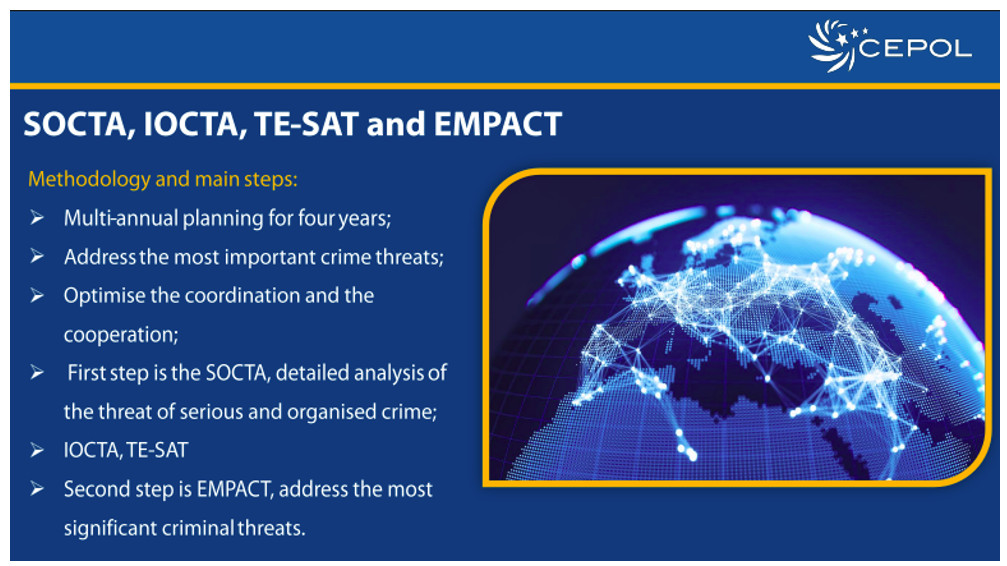
Screengrab from a presentation given by CEPOL at an AIMC conference on 30 June 2021, describing Europol’s portfolio of Threat Assessment reports.
Europol produces three annual reports which each attempt to track terrorism trends, serious and organised crime, as well as internet organised crime across the European Union.
One of these reports, the EU Terrorism Situation & Trend Report (TE-SAT) is seen by Europol as one of its “most significant pieces of strategic analysis” in the EU’s fight against terrorism.
The TE-SAT was established in the aftermath of the September 11 attack in the US as a reporting mechanism to the European Parliament. Europol took over this reporting task in 2006.
The EU has used the TE-SAT in the past to justify some of its law enforcement policies at the international level.
In 2017, the European Commission (EC) requested a mandate to start negotiating the exchange of personal data between the EU and eight non-EU countries for the purpose of fighting terrorism. The eight countries included Morocco, Algeria, Tunisia, Lebanon and Jordan. According to the EC, exchange of personal information with these countries was an operational need for EU law enforcement, which was identified based on data from the TE-SAT.
It might therefore come as no surprise that CEPOL decided to train law enforcement agencies in Arab League countries on how to prepare their own TE-SAT report.
Shortly after its presentation in June 2021, CEPOL announced in September an open tender to support the development of a TE-SAT report for the MENA region.
The contract, valued at €400,000 ($472,000 at the time), was ultimately awarded to a consortium of three organisations based in EU countries.
But, what is surprising is that CEPOL chose to include the AIMC as a partner on the project, despite its controversial role in transnational repression in the region.
When asked for comment, CEPOL said that “cooperation with our EU neighbours is articulated through the implementation of EU-funded projects [...] The Agency relies on the regular advice provided by the European Commission services with regard to the respect for international human rights law and standards by the beneficiary authorities of these projects.”
Asked whether CEPOL was aware of the criticism raised by the UN Special Rapporteurs in their letter, its spokesperson stated that, “as a matter of policy, CEPOL does not comment on opinions expressed by experts of other organisations.”
Besides the AIMC, the other law enforcement agencies tasked with developing the MENA TE-SAT report are the Special Branch of Jordan’s Public Security Directorate, Lebanon’s General Directorate of State Security, Algeria’s and Morocco’s General Directorate for National Security, and Tunisia’s national intelligence Fusion Centre (not to be confused with a NATO-linked “fusion centre” that never came to fruition).
TNA contacted the national law enforcement agencies in Jordan, Lebanon, Morocco and Algeria, and the Tunisian ministry of interior, to comment on their role in the MENA TE-SAT report project. No reply was received at time of publication.
Political obstacles on the road to an AIMC regional mandate
When asked by TNA, the AIMC denied being involved in the production of the MENA TE-SAT report.
However, reports submitted as part of the project, and obtained through a Freedom of Information request, reveal the AIMC’s initial willingness to support the process of generating the TE-SAT report.
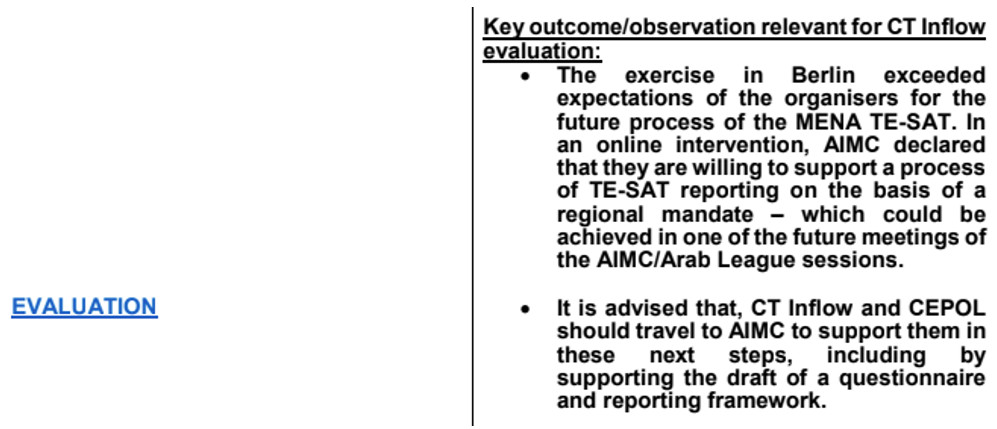
Screengrab from an activity report for November 2022 submitted to CEPOL as part of the MENA TE-SAT project. It lists some of the AIMC’s engagements early in the project.
Representatives from the AIMC reportedly offered to draft “a questionnaire and reporting framework” for the project, as well as negotiate a “regional mandate” for TE-SAT reporting within the Arab League.
The AIMC was also tasked with defining the so-called rules of engagement, meant to guide the data collection work of the national authorities.
However, the collaboration quickly ran against political considerations within the AIMC.
Based on the documents we obtained, the project stalled for months, as it tried to build the political will within the AIMC to pursue a mandate as a regional hub for the MENA TE-SAT.
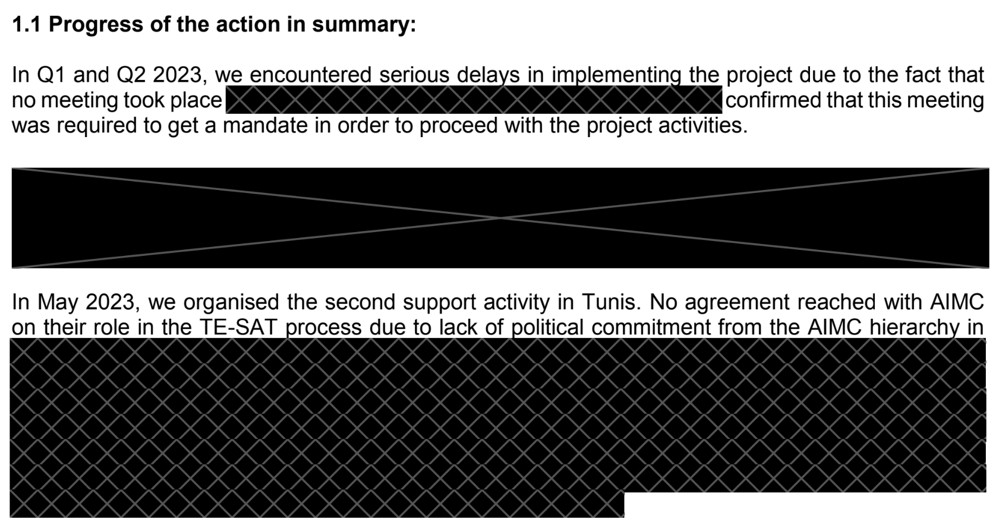
Screengrab of a redacted report submitted by CEPOL’s contractors for the April-June 2023 period of the project. It states that no agreement had been reached with the Arab Interior Ministers’ Council over its role in the MENA TE-SAT process.
In early 2023, CEPOL’s contractors met with the AIMC’s Arab Office for Countering Extremism and Terrorism in Riyadh, Saudi Arabia, to discuss “how to proceed with respect to the crucial role of AIMC in the TE-SAT process”.
This was followed by another meeting, in Tunis this time, on 8 May 2023.
Ultimately, the planned role for the AIMC to coordinate a TE-SAT for the region was abandoned.
One of the reports we obtained - prepared by CEPOL’s contractors after the May visit - states that “it became apparent that further involvement of AIMC in the process would not be feasible.”
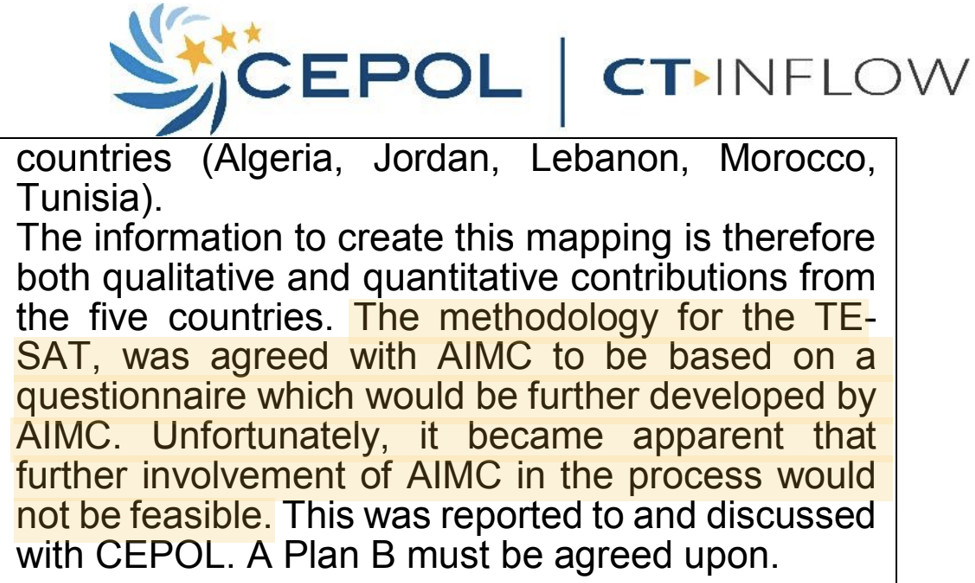
Screengrab of a report submitted by CEPOL’s contractors after the May 2023 visit. It signals the downgrading of the involvement of the Arab Interior Ministers’ Council (AIMC) in the MENA TE-SAT project.
Based on the documents, representatives from the AIMC stopped attending the project’s activities as well.
However, it was agreed that any future publication of the MENA TE-SAT report would require prior approval from the AIMC.
Faced with this setback, CEPOL’s contractors turned to the Algiers-based African Centre for the Study & Research on Terrorism (ACSRT) to complete the project instead.
Established by the African Union in September 2002, the ACSRT maintains the Africa Terrorism Database, a list of terrorism-related events in Africa. Notably, the ACSRT does not maintain any data on Lebanon and Jordan, two participants in the MENA TE-SAT project.
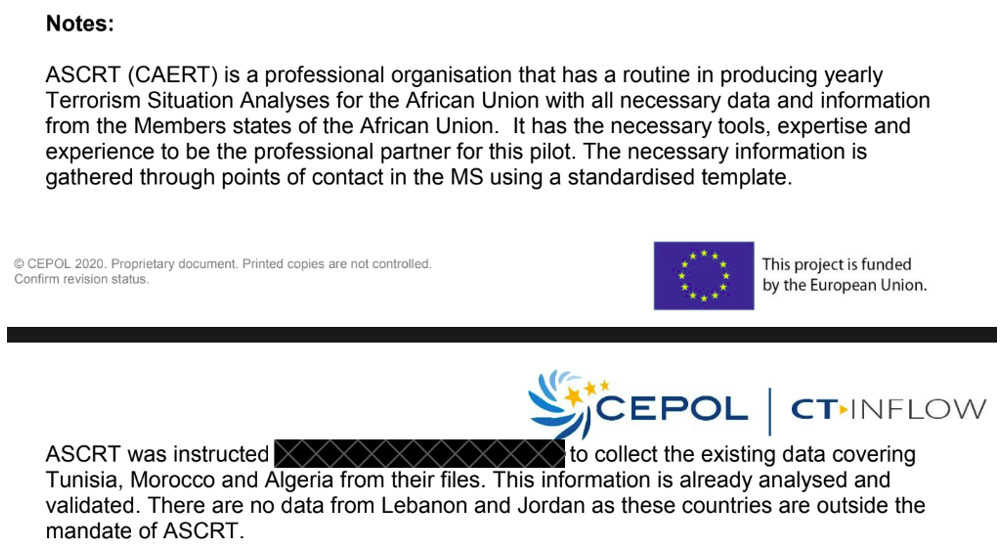
Screengrab of an activity report from June 2023 submitted to CEPOL, laying out the new role for the Algiers-based African Centre for the Study & Research on Terrorism (ACSRT) in the MENA TE-SAT project.
In an email to TNA, the AIMC explained that it had to scale down its engagements because the project was limited to a small subset of Arab states, and therefore it could not engage beyond the scope of its observer mandate.
CEPOL denied in an email to TNA having engaged with the AIMC as a coordinating body for the production of the MENA TE-SAT.
We contacted the ACSRT over email and phone to ask about their involvement in the MENA TE-SAT project. No reply was received at time of publication.
TE-SAT: a tool for transnational repression in Europe?
While CEPOL has been training law enforcement agencies on how to develop a TE-SAT report for the MENA region, transparency activists have been sounding the alarm over the criminalisation impact of this reporting mechanism in the EU.
According to Matthias Monroy, editor of the German civil rights journal Bürgerrechte & Polizei/CILIP, “the TE-SAT is a tool for criminalising left-wing movements, especially anarchism.”
In June 2023, Monroy was first to report on the inclusion of activist networks from the pro-migration AbolishFrontex campaign in Europol’s TE-SAT report.
In October 2023, Europol removed the mention of the campaign from the report after it was criticised by members of Europol’s Parliamentary Scrutiny Board.
Romain Lanneau, researcher at UK-based pro-civil liberties non-profit Statewatch, said his organisation has been denouncing the report’s inclusion of non-violent political activism for years.
According to him, this started with the inclusion of left-wing activists in the 2020 TE-SAT report, and has now moved on to include environmental activists too.
“This is problematic when all across Europe surveillance tools meant to monitor terrorists are increasingly being deployed. We cannot ignore today that there is a general tendency to criminalize activists around Europe and Europol is at the centre of it,” Lanneau told TNA.
We asked Europol to comment on the criminalisation impact of its TE-SAT report and on the extent of its involvement in the MENA TE-SAT report. No reply was received at time of publication.
Monroy is also critical of the lack of transparency in the process used by Europol to generate its TE-SAT.
His request for clarification on the inclusion of the AbolishFrontex campaign in the report went nowhere, and a Freedom of Information request he submitted for the meeting notes of TE-SAT’s advisory board was also rejected.
“[This] demonstrates the lack of transparency of this police-secret service body, which in my opinion should be abolished,” he told The New Arab.
Instead of abolishing, the EU seems keen on exporting it to the MENA region.
CEPOL-AIMC: cooperation with or without working arrangement
As part of the meeting in Cairo between the heads of CEPOL and the AIMC on 20 September 2023, the EU agency intended to discuss the establishment of a working arrangement between the two organisations.
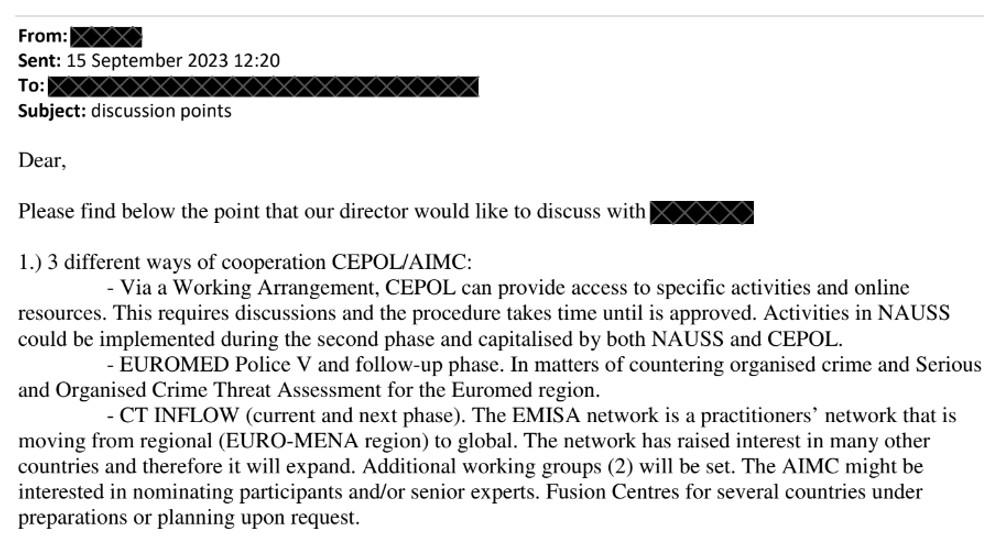
Excerpt from an email sent from CEPOL to the Arab Interior Ministers’ Council (AIMC) on 15 September 2023, laying out the agenda for the meeting.
In an email sent from CEPOL to the AIMC in preparation for their meeting, the EU training agency explained how a working arrangement would provide access to CEPOL’s “specific activities and online resources”.
Access would be provided to NAUSS, the Naif Arab University for Security Sciences in Saudi Arabia, which describes itself as the academic body of the AIMC. Funding for the activities in NAUSS would be shared by both NAUSS and CEPOL.
Khalid Alharfash, NAUSS’ Vice-President for Foreign Relations, who was present at the meeting, told TNA that the topic of a working arrangement was brought up during the meeting, but not in detail.
According to Alharfash, “what distinguishes our strategic partnership with CEPOL is the continuous and fruitful cooperation to which the absence of a signed arrangement is not an obstacle”.
When reached for comment, CEPOL stated that it “has not engaged in any way in negotiations with the Arab Interior Ministers' Council (AIMC) about the potential establishment of a working arrangement”.
“To put it simply, as part of our work, we build dialogues with other organisations and our beneficiary authorities are part of the League of Arab States, under whose auspices the Arab Interior Ministers' Council operates,” it added.
As per Article 34 of its Regulation, CEPOL may establish working arrangements “with authorities and training institutes of third countries [i.e. non-EU]”, but only after having consulted with the European Commission (EC).
TNA contacted the Commission to provide comments on the talks between CEPOL and AIMC with regards to a working arrangement. No reply was received at time of publication despite multiple attempts.
If concluded, a working arrangement with AIMC would be CEPOL’s first accord with an organisation based outside Europe.
Based on similar deals concluded with other international organisations, a working arrangement with CEPOL would give Arab law enforcement bodies access to the agency’s training course catalogue beyond the time-limits of a single project.
In November 2020, six human rights organisations called onto the EU Ombudsman to investigate evidence that several EU bodies, including CEPOL, were supporting surveillance in non-EU countries through some of their projects.
According to UK-based charity Privacy International, “CEPOL [was] facilitating training in surveillance techniques prone for abuse” in MENA countries, for example, through the EC-funded “EU/MENA Counterterrorism Training Partnership 2” project.
In Algeria, CEPOL trained members of Algeria’s National Gendarmerie on open-source intelligence gathering, all the while the country was in the midst of its Hirak protest movement, which led to the resignation of longtime Algerian President Abdelaziz Bouteflika on 2 April 2019.
Meanwhile, a CEPOL delegation sent to Rabat in June 2019 trained the Moroccan General Directorate for National Security on the use of mobile phone data extraction software such as the one produced by Sweden-based Micro Systemation AB.
Reporting by French news outlet Disclose revealed that Morocco was able to acquire this same software some time after the training, using funding from the EU.
In the aftermath of their investigation, the EU Ombudsman recommended that the EC take a “coherent and structured approach” to assessing the human rights impact of its projects.
Lack of scrutiny to continue
CEPOL maintains that their collaboration with the AIMC is lawful.
The EU agency told TNA that it provides training to non-EU countries “in line with its legal basis, the relevant policies of the European Union and based on the combined experience and know-how of law enforcement authorities and agencies across the EU”.
In the view of Ilia Siatitsa, senior legal officer at Privacy International, working arrangements would “add an extra layer of responsibility on behalf of CEPOL”.
CEPOL would need to conduct “necessary due diligence around with whom they are signing these agreements, and whether they are actually operating under the same standards as CEPOL,” Siatitsa told TNA.
Asked whether they had conducted such assessments besides the “regular advice” they had received from the European Commission, CEPOL declined to comment.
We also asked the European Commission the same question. We did not receive a response in time for publication.
The European Parliament, one of the legislative bodies of the EU, could also have a role to play in bringing more transparency into the negotiation process between the EU agencies and their non-EU counterparts, according to Green Member of Parliament Saskia Bricmont.
“For effective cooperation that complies with the international obligations of the EU, [international police] cooperation must respect fundamental rights and data protection,” Bricmont told The New Arab.
Bricmont, who sits on Europol’s Parliamentary Scrutiny Board, suggested multiple avenues that the Parliament could use to oversee this compliance, including through the use of a parliamentary budget vote.
“We demand transparency from the European Commission and the agencies regarding the agreements they negotiate, even if they are technical cooperation agreements,” she added.
It is doubtful whether many of Bricmont’s co-legislators will heed her call. Elections for the selection of new European legislators were held on 9 June, resulting in a more right-wing parliament. Right-leaning groups in Europe generally tend to favour the expansion of police competencies and cooperation, including at the expense of human rights obligations.
In the meantime, CEPOL’s collaboration with the AIMC is continuing unhampered. CEPOL’s two projects in the MENA region, initially planned to end by 31 March 2024, have been extended by three and six months each.
Author: Anas Ambri
Editor: Andrea Glioti
Our work is only possible with your support.
Become a Friend of Statewatch from as little as £1/€1 per month.
Further reading
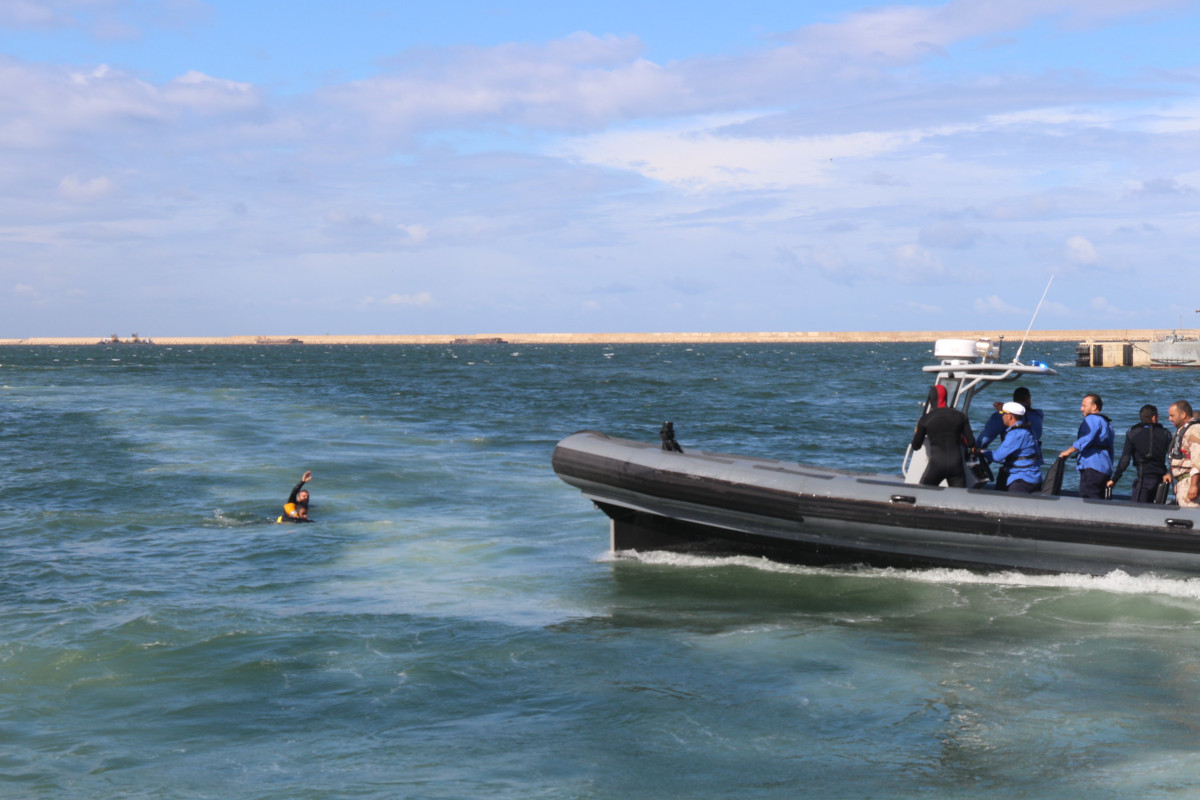
EU to step up support for human rights abuses in North Africa
In a letter to the European Council trumpeting the EU’s efforts to control migration, European Commission president Ursula von der Leyen highlighted the provision of vessels and support to coast guards in Libya and Tunisia, where refugee and migrant rights are routinely violated.

EU to provide training on “covert techniques” to abusive police forces
The European Police College is to train a host of states with miserable human rights records on the use of “covert techniques in forensics and mobile telecommunications” and will provide “training activities related to cyber-attacks in order to build capacities for law enforcement, judicial authorities and other relevant bodies.”

New Europol rules massively expand police powers and reduce rights protections
The new rules governing Europol, which came into force at the end of June, massively expand the tasks and powers of the EU’s policing agency whilst reducing external scrutiny of its data processing operations and rights protections for individuals, says a report published today by Statewatch.
Spotted an error? If you've spotted a problem with this page, just click once to let us know.

